|
|
|
Sort Order |
|
|
|
Items / Page
|
|
|
|
|
|
|
| Srl | Item |
| 1 |
ID:
155850


|
|
|
|
|
| Summary/Abstract |
This article investigates drivers and mechanisms of policy legitimation in authoritarian states. In highly interconnected and digitalised environments, non-democratic states need to legitimise their policies in order to maintain and cultivate the support of their populations. While democracies are more likely to pursue legitimation through enhanced policy performance, authoritarian states are likely to legitimise their actions through repression and control mechanisms: information control, enhancement of popular sentiments, and narrative shaping. The article elucidates these arguments by focusing on Russia’s actions in three specific contexts, namely Crimea’s annexation, the destruction of sanctioned food products, and military involvement in the Syrian crisis.
|
|
|
|
|
|
|
|
|
|
|
|
|
|
|
|
| 2 |
ID:
128329
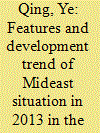

|
|
|
|
|
| Publication |
2013.
|
| Summary/Abstract |
The situation in Middle East is full of twists and turns in 2013, demonstrating a transitional character of the transformation of regional architecture. It has projected a certain extent of inheritance on the one hand and some tendencies for future development on the other. The adjustment of Mideast regional architecture will be shaped in the process of continuous rivalry between the new and old forces, the mutual adaptation of new and old modes and constant interaction between big powers and regional countries.
|
|
|
|
|
|
|
|
|
|
|
|
|
|
|
|
| 3 |
ID:
124798


|
|
|
|
|
| Publication |
2013.
|
| Summary/Abstract |
GERMANY VIEWS THE UNITED NATIONS as the central, most versatile tool for maintaining global peace and stability, all the while paying tribute to the significant role played by regional organizations and groups, primarily the EU, NATO and the OSCE, in this regard. The FRG stands ready to take on a greater burden of responsibility within the UN with the hope of getting a permanent seat in the Organization's most powerful body, the Security Council. Germany regards its wide experience with UN specialized agencies in the implementation of programs of economic development and cooperation for developing countries, its extensive financial assistance to them and, finally, its active participation in peacekeeping missions as strong arguments to enhance its role and influence in the UN. Based on this logic, the FRG seeks, as often as possible (about once every seven or eight years), to ensure its participation in the work of the Security Council as a non-permanent member.
|
|
|
|
|
|
|
|
|
|
|
|
|
|
|
|
| 4 |
ID:
125209
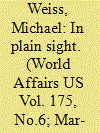

|
|
|
|
|
| Publication |
2013.
|
| Summary/Abstract |
Although the US-Russian relationship continues to deteriorate in the face of a vengeful Kremlin ban on American adoptions of Russian orphans, Vladimir Putin is still pursuing a strategy of influencing-and infiltrating-European political establishments. Given the amount of capital that Russia and her billionaire oligarchs have invested in the continent, this policy is as much defensive as it is self-interested. The European Commission's deadly-serious investigation into Gazprom's monopolistic practices, the beginning of the end of German Ostpolitik, and the ongoing dispute with Russia over the Syria crisis hint at an imminent confrontation between Moscow and EU countries. And while state-owned media outlets turn out anti-American propaganda to match equivalent policy measures, for the time being, Russia is still very much committed to swaying European opinion by using both transparent economic appeals (especially in the energy sector, the Gazprom case notwithstanding) and also the kind of Le Carré-esque skulduggery that was supposed to have vanished with the Cold War.
|
|
|
|
|
|
|
|
|
|
|
|
|
|
|
|
| 5 |
ID:
193251
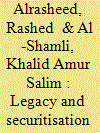

|
|
|
|
|
| Summary/Abstract |
After the Arab Spring took place in Syria in 2011, the relationship between the rulers and the ruled across the region became increasingly strained. In a fractious context, several opposition groups sought to overthrow the regime in Syria, as a consequence of a perceived lack of religious legitimacy. The Lebanese Hezbollah policies towards the Syrian crisis have been impacted by ideological variables, the regional balance of power, Arab community structures, and geo-strategic factors. Hassan Nasrallah, the leader of Lebanese Hezbollah has regularly delivered speeches to secure the survival of the Axis of Resistance. The main aim of this paper is to investigate the objects of threat and the legacies which were used for the securitisation in the Syrian crisis. The authors, Rashed Alrasheed and Khalid Amur Salim Al-Shamli show that legacy issues facilitate the securitisation of Israel, USA, ISIS, and Sunni groups in Syria and generate suitable circumstances to move the audience of the Axis of Resistanc.
|
|
|
|
|
|
|
|
|
|
|
|
|
|
|
|
| 6 |
ID:
161258
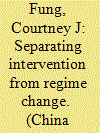

|
|
|
|
|
| Summary/Abstract |
China's response to the recent Syria crisis at the UN Security Council represents a crucial case in China's approach to intervention in that it breaks from China's recent practice of becoming more permissive regarding intervention. Instead, China actively worked to ensure that a firm line was drawn to separate intervention from foreign-imposed regime change. It did so by employing three diplomatic innovations: exercising multiple, successive vetoes; expanding discourse to delegitimize intervention as “regime change” by Western powers; and engaging in norm-shaping of the international community's “responsibility to protect” post-intervention. Together, these three innovations highlight China's desire to firmly separate the intervention norm from that of regime change. Using a variety of primary sources, the article also draws insights from interviews with foreign policy elites in Beijing, New York and New Delhi.
|
|
|
|
|
|
|
|
|
|
|
|
|
|
|
|
| 7 |
ID:
161171
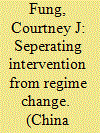

|
|
|
|
|
| Summary/Abstract |
China's response to the recent Syria crisis at the UN Security Council represents a crucial case in China's approach to intervention in that it breaks from China's recent practice of becoming more permissive regarding intervention. Instead, China actively worked to ensure that a firm line was drawn to separate intervention from foreign-imposed regime change. It did so by employing three diplomatic innovations: exercising multiple, successive vetoes; expanding discourse to delegitimize intervention as “regime change” by Western powers; and engaging in norm-shaping of the international community's “responsibility to protect” post-intervention. Together, these three innovations highlight China's desire to firmly separate the intervention norm from that of regime change. Using a variety of primary sources, the article also draws insights from interviews with foreign policy elites in Beijing, New York and New Delhi.
|
|
|
|
|
|
|
|
|
|
|
|
|
|
|
|
|
|
|
|
|